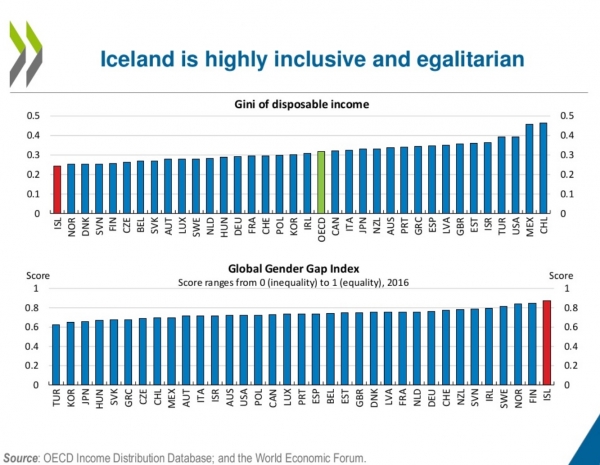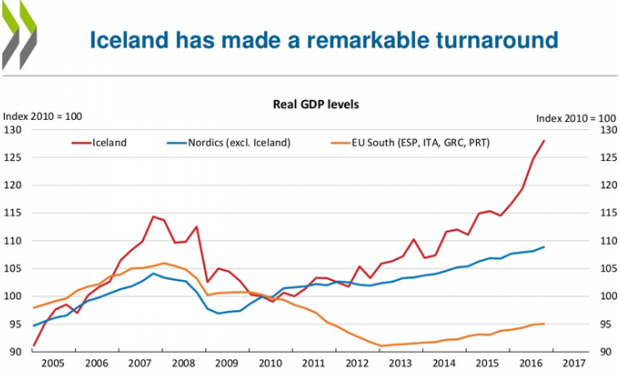Iceland has made a remarkable turnaround from the 2008 crisis, the latest economic survey of Iceland by the OECD concludes. The OECD remarks that Iceland has made a more decisive recovery than both the Nordic Countries and the Southern European members of the EU, many of which have struggled to recover from the effects of the crash.
Most unionized and egalitarian OECD country – highest growthrates in OECD
The economic recovery of Iceland has been made possible by a staggering growth of tourism, prudent economic policies and a favorable external environment. The OECD also points out that Iceland has an egalitarian society with the highest unionization rates in the OECD.
Iceland has high living standards, low poverty, high inclusiveness and one of the most sustainable pension systems. It is the most highly unionised OECD country. In the past, successful social pacts have protected the lowest paid workers during crises, and on occasion helped fight inflation.
Iceland is currently the fastest growing OECD country.
Underlying imbalances have been addressed
The survey finds that many of the imbalances and structural problems which the Icelandic economy was plagued with in the lead up to the 2008 crisis. The current account of Iceland is positive, while debts have been paid down. Public debt has been paid down, while both corporate and household debt has decreased dramatically in the past years.
As Icelandic homes have improved their balance sheets fewer homes having negative assets. According to data from the Internal Revenue Service 18.2% of Icelandic homes had debts which exceeded their assets in 2016. As of today this figure has dropped to 16.5%. The number has been dropping continiously since 2011. Currently 33,000 of households out of 197,000 have debts whic exceed their assets.

Iceland has made a remarkable turnaround from the 2008 crisis, the latest economic survey of Iceland by the OECD concludes. The OECD remarks that Iceland has made a more decisive recovery than both the Nordic Countries and the Southern European members of the EU, many of which have struggled to recover from the effects of the crash.
Most unionized and egalitarian OECD country – highest growthrates in OECD
The economic recovery of Iceland has been made possible by a staggering growth of tourism, prudent economic policies and a favorable external environment. The OECD also points out that Iceland has an egalitarian society with the highest unionization rates in the OECD.
Iceland has high living standards, low poverty, high inclusiveness and one of the most sustainable pension systems. It is the most highly unionised OECD country. In the past, successful social pacts have protected the lowest paid workers during crises, and on occasion helped fight inflation.
Iceland is currently the fastest growing OECD country.
Underlying imbalances have been addressed
The survey finds that many of the imbalances and structural problems which the Icelandic economy was plagued with in the lead up to the 2008 crisis. The current account of Iceland is positive, while debts have been paid down. Public debt has been paid down, while both corporate and household debt has decreased dramatically in the past years.
As Icelandic homes have improved their balance sheets fewer homes having negative assets. According to data from the Internal Revenue Service 18.2% of Icelandic homes had debts which exceeded their assets in 2016. As of today this figure has dropped to 16.5%. The number has been dropping continiously since 2011. Currently 33,000 of households out of 197,000 have debts whic exceed their assets.








